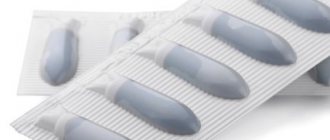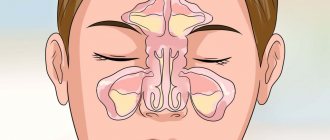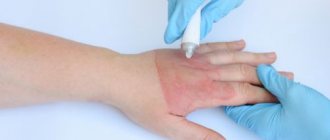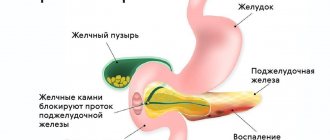Pharmacodynamics and pharmacokinetics
Nitroglycerin is a peripheral vasodilator, mainly affecting the venous vessels. This effectiveness of this substance is made possible due to the release of the active ingredient nitric oxide , which increases the level of cGMP and activates guanylate cyclase , which ultimately leads to relaxation of smooth muscle tissue. Under the influence of nitroglycerin, precapillary sphincters and arterioles are less relaxed compared to large veins and arteries . To a certain extent, this occurs due to reflex reactions, as well as due to less intense production of nitric oxide in the walls of arterioles .
With local external use of nitroglycerin, it is absorbed quite quickly, accompanied by local dilation of blood vessels and improved blood circulation at the site of application of the drug. When using the ointment in the colorectal area, relaxation of the anal sphincter , due to which the trauma to existing cracks and their healing is accelerated. When the drug is applied to the skin of the male genital organ, there is an increase in blood supply to the cavernous bodies, which leads to improved erectile function .
List of effective drugs
Common remedies for hemorrhoids are divided according to their effect in suppressing symptoms, active ingredients and cost. The list of popular medications is presented:
Relief
Medicine with anti-inflammatory, vasoconstrictive and regenerative spectrum of action. By reducing the lumen of blood vessels, the burning sensation and itching are reduced, and tissue restoration begins. The ointment stops bleeding and reduces the level of inflammation. The medicine is recommended for use for fissures in the anal area.
The drug is prohibited:
- patients under 12 years of age;
- with thromboembolism;
- granulocytopenia;
- increased sensitivity.
Particular caution is needed when used by patients with diabetes mellitus, prostate hypertrophy, hyperthyroidism, a history of hypertension, during pregnancy or breastfeeding.
Bezornilom
The medicine has an analgesic effect and can be used to prevent the development of swelling and inflammation. The composition of the drug is presented:
- borneol;
- pearls;
- amber;
- musk; zinc compounds.
The medication is prescribed to patients with hemorrhoids, anal wounds after surgery, fissures and eczema of the anus. It is considered an effective remedy with an improvement in the general condition of the patient on the second day from the start of therapy.
The drug is not prescribed for individual intolerance to individual components.
Proctosan
A non-hormonal agent with the effect of suppressing inflammation and the active component bufexamac. The vismus contained in the composition stops local bleeding and has an astringent effect, and titanium accelerates the regeneration of cracked tissues.
Lidocaine relieves pain, burning and itching. The drug is not recommended for children, pregnant and lactating women, patients with syphilis, pelvic tuberculosis.
Heparin ointment
Each of the components of the drug has an individual spectrum of action:
- antithrombic effect with a decrease in the inflammatory process - with heparin;
- anesthetic - benzocaine;
- vasodilator - benzyl nicotinate.
The medication is prohibited for use in cases of skin necrosis and damage, a tendency to spontaneous bleeding, and decreased blood clotting.
Troxevasin
The medicine reduces capillary fragility, has an anti-edematous and anti-inflammatory effect. The ointment accelerates regeneration processes at the cellular level. Hypoallergenic, does not provoke pronounced adverse reactions to the component composition. The drug is contraindicated in people with a tendency to bleeding, with a reduced rate of blood clotting and damage to the skin.
Contraindications
The ointment is not recommended for use when:
- pronounced negative symptoms inherent in arterial hypotension ;
- diagnosed severe pathologies of cardiovascular origin;
- personal hypersensitivity to nitroglycerin or to the ointment base;
- parallel use of medicinal products, including organic nitrates .
Use the drug with caution:
- elderly patients;
- lactating and pregnant women.
Side effects
If Nitroglycerin ointment is used in excessive amounts, headaches and/or dizziness may develop blood pressure . Due to the potential for such negative effects, doctors recommend that their patients apply this ointment while lying down. Also, to prevent these undesirable effects, the patient must wash his hands thoroughly after applying the drug.
With prolonged use of Nitroglycerin ointment, all of the above side effects become less pronounced, and the positive effect of the drug decreases.
If you experience any negative effects from topical use of nitroglycerin-based ointment, the patient should stop using it and consult with your doctor.
Nitro
Orally, sublingually, buccally, intravenously, transdermally, cutaneously.
Relief of angina pectoris. Sublingually (the tablet or capsule is kept under the tongue until completely absorbed, without swallowing), immediately after the onset of pain - 0.5-1 mg per dose. If necessary, to achieve a faster effect, the capsule should be immediately crushed with teeth; the capsule can be repeated after 30-40 minutes. In many patients with stable angina, the effect occurs with a smaller dose (1/2-1/3 tablets), therefore, if the pain goes away quickly, it is recommended to spit out the remainder of the tablet that has not had time to dissolve. Typically, the antianginal effect appears within 0.5-2 minutes; 75% of patients note improvement within the first 3 minutes, and another 15% within 4-5 minutes. If there is no antianginal effect, another 0.5 mg of the drug should be taken during the first 5 minutes. If there is no therapeutic effect after taking 2-3 tablets, you should immediately call a doctor. Duration of action after sublingual administration is about 45 minutes.
For frequent attacks of angina, it is advisable to prescribe prolonged forms of nitrates. If an attack of angina develops during treatment with long-acting nitrates, to relieve an acute attack it is necessary to take the drug sublingually. Tolerance to sublingual forms of the drug develops infrequently, however, if it occurs in some patients, the dose of the drug must be gradually increased, bringing it to 2-3 tablets.
To prevent angina pectoris, take it orally with water before meals. In mild cases - 1-2 tablets of 2.9 mg 2-3 times a day. In more severe cases - 1-2 tablets of 5.2 mg 2-3 times a day. The maximum daily dose is 34.8 mg. Due to the fact that the bioavailability of the drug from retard tablets is low, it is recommended, if well tolerated, to take 1-3 tablets at a time regularly 3-4 times a day or periodically, 30-40 minutes before the expected physical activity. If the therapeutic effect is insufficient, the dose can be gradually increased (but not more than 2 tablets per dose), and after the onset of a therapeutic effect, it can be reduced.
1% solution for sublingual use: relief of an attack - 1-2 drops sublingually or 2-3 drops applied to a small piece of sugar and keep it in the mouth, without swallowing, until completely absorbed.
Buccal: a plate with a selected dose of the drug is glued to the oral mucosa, usually in the upper gum area above the canines or small molars. To do this, simply press the plate with your finger against the oral mucosa for a few seconds. The action occurs almost immediately and lasts 3-4 hours or more.
Transdermal: treatment begins with the application of one TTC 5 patch (0.2 mg/h) per day. To maintain therapy, the daily dose can be increased by attaching an additional patch (0.2 mg/h) and/or TTC 10 (0.4 mg/h). The maximum daily dose is the application of 2 TTC 10 patches (0.8 mg/hour). For CHF, it is recommended to begin and carry out treatment in a hospital setting until the patient is transferred to the required maintenance dose. The optimal dose should be determined (taking into account the clinical response and possible side effects). In this case, you should strictly monitor the appearance of signs of overdose (decreased blood pressure and tachycardia).
Cutaneously (ointment): the initial dose is 2.5 cm of ointment. If the effect is insufficient, the dose is gradually increased to 5-10 cm. The maximum single dose is 15 cm. The ointment is used 2-3 times a day. The prescribed amount of ointment is squeezed onto the dosing paper scale, the paper is attached tightly to a hairless area of skin (in the area of the upper chest, abdomen, outer thigh).
Aerosol, spray for sublingual use: to relieve an attack of angina - 0.4-0.8 mg (1-2 doses), pressing the dosing valve, preferably in a sitting position, while holding your breath at intervals of 30 seconds; After this, you should close your mouth for a few seconds. If necessary, repeat administration, but not more than 1.2 mg (3 doses) over 15 minutes. To prevent the development of an attack - 0.4 mg (1 dose) 5-10 minutes before exercise. In case of acute LV failure, developing pulmonary edema - 1.6 mg (4 doses) or more in a short period of time (under strict medical supervision).
IV administration should be carried out with individual selection of the rate of drug administration. The solution is administered through an automatic dispenser or through a conventional IV system. The automatic dispenser allows you to administer even an undiluted 0.1% solution with precise dosing of the rhythm of administration and the total dose. Administration through a conventional fluid transfusion system ensures precise dosage selection by counting the number of drops. When using a polyvinyl chloride tube system, the active substance is absorbed and losses on the tube walls are up to 60% (it is advisable to use polyethylene and glass tubes). The solution quickly degrades in light, so the vials and transfusion system must be shielded with light-proof material.
Typically, an infusion solution with a concentration of 100 mcg/ml is used: the concentrated solution is diluted with 0.9% NaCl solution or 5% dextrose solution (other solvents should not be used). The solution is administered intravenously at an initial rate of 5 mcg/min. The rate of administration can be increased every 3-5 minutes by 5 mcg/min (depending on the effect and response of heart rate, central venous pressure and systolic blood pressure, which can be reduced by 10-25% of the original, but should not be lower than 90 mm Hg .st.). If no therapeutic effect is obtained at an injection rate of 20 mcg/min, a further increase in the injection rate should be 10-20 mcg/min. If a response occurs (in particular, a decrease in blood pressure), a further increase in the infusion rate is not carried out or is carried out at longer intervals.
To achieve a good effect, the rate of administration of a 0.01% solution of the drug usually does not exceed 100 mcg/min (1 ml/min). If there is no effect from lower doses and the blood pressure level is acceptable, the rate of administration of a 0.01% solution can reach 300 mcg/min (3 ml/min). Further increase in speed is not advisable.
The duration of treatment is determined by clinical indications and can be 2-3 days.
The drug for intravenous administration, if necessary, can be re-administered at any time intervals.
Nitroglycerin ointment, instructions for use (method and dosage)
If the drug is used in proctology to alleviate painful conditions that have developed as a result of the formation of hemorrhoids and the appearance of anal fissures , the ointment should be applied topically to the colorectal area 2-4 times a day. To do this, you need to apply a small amount of the medicinal product to the tip of a cotton swab and insert it into the anus to a shallow depth (if the ointment is used only around the anus , its therapeutic effectiveness may be insufficient). If a patient experiences severe pain in the anorectal area, he is recommended to first lubricate the anus with the drug and only after some time inject the ointment into the rectum. The duration of such a course of treatment, as a rule, varies within 30 days (longer use is permissible only on the recommendation of the attending physician).
Nitroglycerin ointment to increase potency and/or maintain erectile function is prescribed exclusively externally immediately before supposed sexual intercourse . A small amount of the medicinal product should be applied to the skin of the penis with massaging and light movements of the palm, avoiding contact of the ointment directly on the foreskin and head of the penis . It is better to limit the frequency of use of the drug to one application per day. To prevent negative effects that are potentially possible when nitroglycerin through the mucous membranes of both sexual partners, a condom must be used during sexual intercourse.
After using the ointment, the patient should carefully wash their hands with soapy water.
| NITROGLYCERIN OINTMENT 0.2%. |
Nitroglycerin is a peripheral vasodilator, mainly affecting the venous vessels. This effectiveness of this substance is made possible due to the release of the active ingredient nitric oxide in the smooth vascular muscles, which increases the level of cGMP and activates guanylate cyclase, which ultimately leads to relaxation of smooth muscle tissue.
Under the influence of nitroglycerin, precapillary sphincters and arterioles are less relaxed than large veins and arteries. To a certain extent, this occurs due to reflex reactions, as well as due to less intense production of nitric oxide in the walls of arterioles. With local external use of nitroglycerin, it is absorbed quite quickly, accompanied by local dilation of blood vessels and improved blood circulation at the site of application of the drug. When using the ointment in the colorectal area, relaxation of the anal sphincter is observed, due to which the trauma to existing cracks is reduced and their healing is accelerated. When the drug is applied to the skin of the male genital organ, there is an increase in blood supply to the cavernous bodies, which leads to improved erectile function. Composition per 100 g of ointment: per 100 g of ointment: nitroglycerin 0.2 g, petroleum jelly 85 g, anhydrous lanolin 10 g, glycerin 5 g.
Indications.
— in proctology;
in order to alleviate painful conditions that have developed as a result of the formation of hemorrhoids and the appearance of anal fissures; - in urology; as a local remedy to enhance potency (erectile function). Contraindications.
pronounced negative symptoms inherent in arterial hypotension;
diagnosed severe pathologies of cardiovascular origin; personal hypersensitivity to nitroglycerin or to the ointment base; parallel intake of medications including organic nitrates. The drug should be used with caution:
in elderly patients;
lactating and pregnant women. Side effects
If Nitroglycerin ointment is used in excessive amounts, headaches and/or dizziness may develop due to excessive vasodilation and decreased blood pressure.
Due to the potential for such negative effects, doctors recommend that their patients apply this ointment while lying down. Also, to prevent these undesirable effects, the patient must wash his hands thoroughly after applying the drug. With prolonged use of Nitroglycerin ointment, all of the above side effects become less pronounced, and the positive effect of the drug decreases. If you experience any negative effects from topical use of nitroglycerin-based ointment, the patient should stop using it and consult with your doctor. Method of administration and dose.
If the drug is used in proctology to alleviate painful conditions that have developed as a result of the formation of hemorrhoids and the appearance of anal fissures, the ointment should be applied topically to the colorectal area 2-4 times a day. To do this, you need to apply a small amount of the medicinal product to the tip of a cotton swab and insert it into the anus to a shallow depth (if the ointment is used only around the anus, its therapeutic effectiveness may be insufficient). If a patient experiences severe pain in the anorectal area, he is recommended to first lubricate the anus with the drug and only after some time inject the ointment into the rectum. The duration of such a course of treatment, as a rule, varies within 30 days (longer use is permissible only on the recommendation of the attending physician). Nitroglycerin ointment to increase potency and/or maintain erectile function is prescribed exclusively externally immediately before supposed sexual intercourse. A small amount of the medicinal product should be applied to the skin of the penis with massaging and light movements of the palm, avoiding contact of the ointment directly on the foreskin and head of the penis. It is better to limit the frequency of use of the drug to one application per day. To prevent negative effects that are potentially possible when nitroglycerin is absorbed through the mucous membranes of both sexual partners, a condom must be used during sexual intercourse. After using the ointment, the patient should carefully wash their hands with soapy water.
Cost of 1 can of 50g: 400 rub.
Check availability by phone.
special instructions
Due to the fact that especially rapid absorption of nitroglycerin is observed with good blood flow, the ointment should be applied no earlier than 30 minutes after taking a hot bath, since at this time blood .
Due to the potential for side effects such as headaches and/or dizziness , it is best to avoid driving or performing hazardous work immediately after using this medication.
Ointment Nitro 2%
Name: Ointment “Nitro” 2% (Unguentum “Nitro” 2%) Indications for use: For the relief (relief) of angina attacks; sometimes with dyskinesia (impaired mobility) of the biliary tract and embolism (blockage) of the central retinal artery. The drug is also used for left ventricular failure, including myocardial infarction.
Method of use: The dose is selected individually by squeezing out a rod of different lengths from the tube (tube), measured with the included ruler (from 0.5 to 5 cm). After applying the ointment, the skin area is covered with waterproof paper and secured with a bandage. The effect characteristic of the action of nitrates usually occurs after 30-40 minutes and lasts about 2-5 hours. The ointment is a long-acting nitrate preparation and is usually prescribed as an additional remedy with orally administered nitrates for the prevention of angina attacks . The dose and frequency of application of the ointment should be set individually, taking into account significant fluctuations in the absorption of nitroglycerin from the ointment in different patients, as well as in the same patient, depending on the ambient temperature, skin temperature and humidity and other factors.
Side effects: Shock, collapse (sharp drop in blood pressure), arterial hypotension (systolic pressure below 90-100 mm Hg, diastolic pressure below 60 mm Hg), toxic pulmonary edema, hemorrhagic stroke (acute cerebrovascular accident as a result of rupture of cerebral vessels), increased intracranial pressure, angle-closure glaucoma (increased intraocular pressure).
Contraindications: Cerebral hemorrhage, increased intracranial pressure, severe hypotension (low blood pressure), as well as angle-closure glaucoma (increased intraocular pressure). In open-angle glaucoma, nitroglycerin is not contraindicated.
Release form: In tubes containing 45 g of ointment. The ointment contains 20 mg of nitroglycerin per 1 g (for cutaneous use). The ointment base (paraffin, cetanol, hydroxypropylcellulose, petroleum jelly) promotes the absorption of nitroglycerin by the skin. The ointment can be applied to different areas of the skin (usually in the area of the heart, forearm, etc.).
Storage conditions: List B. In a cool place.
Synonyms: Myovin, Nitrol, Nitrobid, Nitroglycerin.
Attention! The description of the drug “Nitro Ointment 2% ” on this page is a simplified and expanded version of the official instructions for use. Before purchasing or using the drug, you should consult your doctor and read the instructions approved by the manufacturer. Information about the drug is provided for informational purposes only and should not be used as a guide to self-medication. Only a doctor can decide to prescribe the drug, as well as determine the dose and methods of its use.
Reviews
Patients suffering from negative manifestations of hemorrhoids often leave extremely positive reviews about Nitroglycerin ointment for anal fissures . They note that when using this drug, already in the first days there is a significant relief from the pain and bleeding of cracks , and with a course of use of the drug, complete healing of problem skin areas occurs within 2-3 weeks. Also, applying this ointment facilitates the process of defecation and promotes healthy sleep. Naturally, Nitroglycerin ointment alone will not be enough to fully treat the problem of hemorrhoids , and the only correct solution in this situation will be a consultation with a proctologist, undergoing the necessary studies and then prescribing adequate therapy.
The use of Nitroglycerin ointment to increase potency is also quite often discussed on the Internet in various specialized forums. In this case, reviews about the effectiveness of this remedy are ambiguous, and along with a purely positive assessment of the drug’s effect, there are also absolutely critical reviews about the advisability of its use. Most likely, the matter is in the individual reasons for the decrease in erectile function and the severity of this pathological condition, which requires a different approach to treatment and the use of different medications.
Nitroglycerin ointment price, where to buy
It should be remembered that today in the post-Soviet countries it is not possible to buy factory-produced Nitroglycerin ointment, since this medicine is not officially registered. In this regard, purchasing this drug is difficult and requires an individual prescription from the attending physician and ordering the drug from an industrial pharmacy that manufactures drugs.
In this case, the price of Nitroglycerin ointment 0.2%, prepared according to an individual recipe, should be in the range of 250-350 rubles per 30 gram bottle.









